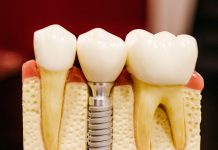Dental implant Costs are based on you need for prosthetic replacements for any missing teeth.
Implants comprise of a picture made of varying materials that is surgically placed into the jaw.
These materials give way for the bone to grow and fuse with it in the creation of a new false tooth.
They originated in 1952 in Sweden by an orthopedic surgeon by the name of Per-Ingvar Branemark and have become more commonly used.
There are a total of three phases in the surgical process in order to complete the false tooth.
First Phase
The first is a simple evaluation by a dentist or orthodontist and preparation for the procedure.
This will often include a VT scan and can mean anything from the extraction of the damaged tooth to bone grafting.
If there is no need for grafting than the surgery can move straight into phase two; synthetic replacement of the root.
If no grafting is needed it means lower dental implant Costs.
Second Phase
Once the artificial root is in place the client is given a three to six month healing period.
This allows the pseudo root to merge and form with the natural neighboring bone tissue.
This longer period is also recommended as standard procedure due to the stress and pressure that is applied to the oral cavity.
This aims to prevent any injury.
It is after this healing period that the final phase is completed and a crown is put in place of the artificial root, thus completing the prosthetic tooth.
Third Phase
Phase three standardly takes two separate visits approximately two weeks apart.
The total surgical times also vary depending on each client.
Despite the arduous length of the process, one will be in the dental chair for no more than one to two hours for each of the individual three sessions.
The total length of healing and fixation of the new tooth depends partially on the care and maintenance the prosthetic receives after the surgery.
Caution is crucial at these times.
Costs for dental implants vary on the region, damage to the tooth and doctor who is performing the procedure.
Costs average somewhere between $3,000 to a little over $4,000.
Dental insurance does not usually pay for dental implants, however, some may aid in the payment of the crown.
Potential risks do exist as with any surgical procedure.
Most are bypassed through careful inspection of the patients’ medical background.
Any damage that does occur to the implant should be mentioned immediately in order to be corrected.
This includes discomfort and poor placement of the prosthetic or damage to the surrounding tissue.




